FRUITS
NUTS
SEEDS
SPICES
VEGETABLES
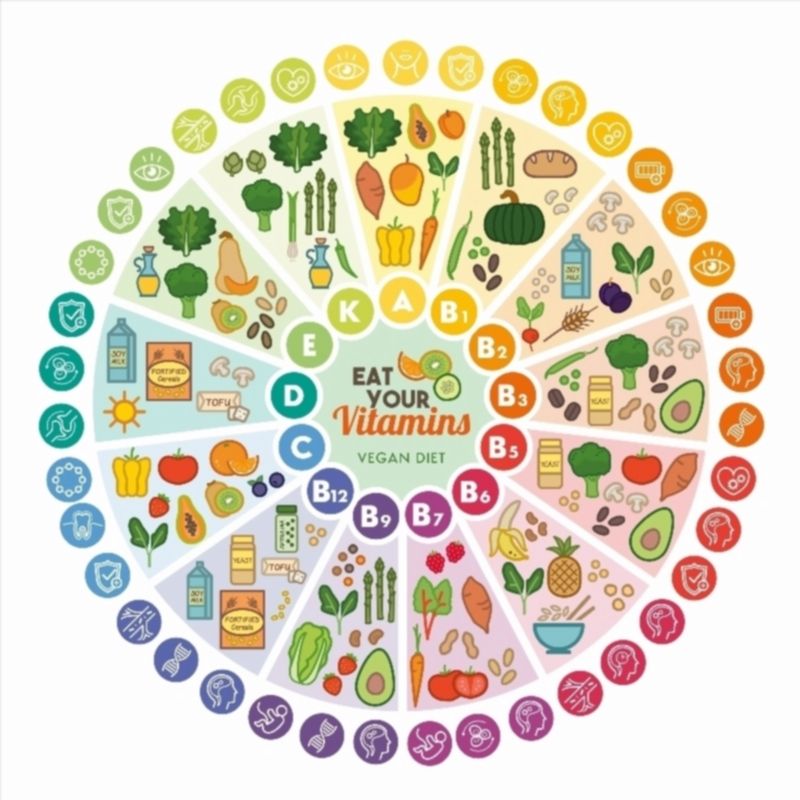
Image found on https://www.pinterest.com/pin/319051954841352246/?nic_v1=1arY1oW%2BCjcqPo1IyN1VSnDylJ0T%2FEItIejm%2BtfGjfOHx0X3dpU1jfa9DdUu2Kd8tI and links to Print Me Poster at https://printmeposter.com/poster_photo__130978790.html
______________________________
FRUITS
Apples
Apples are a good source of fiber and vitamin C. They also contain polyphenols, which may have numerous health benefits. Apples are incredibly good for you, and eating them is linked to a lower risk of many major diseases, including diabetes and cancer. What’s more, its soluble fiber content may promote weight loss and gut health.
Vitamins – C, K and Potassium
Weight Loss – They’re also particularly filling due to their high fiber content.

Heart Health – They’re high in soluble fiber, which helps lower cholesterol. They also have polyphenols, which are linked to lower blood pressure and stroke risk.
Lower Risk of Type 2 Diabetes – This is possibly due to their polyphenol antioxidant content.
Obesity – The type of fiber in apples feeds good bacteria and may be the reason they protect against obesity, heart disease, and type 2 diabetes.
Cancer – Apples have several naturally occurring compounds that may help fight cancer. Observational studies have linked them to a lower risk of cancer and death from cancer.
Asthma – Apples contain antioxidant and anti-inflammatory compounds that may help regulate immune responses and protect against asthma.
Bone Health – The antioxidant and anti-inflammatory compounds in apples may promote bone health. What’s more, eating fruit may help preserve bone mass as you age.
Stomach Lining – Apples contain compounds that may help protect your stomach lining from injury due to NSAID painkillers.
Memory – According to animal studies, apple juice may help prevent the decline of neurotransmitters that are involved in memory.
Learn more about Apples by visiting https://www.healthline.com/nutrition/10-health-benefits-of-apples#section7 Written by Kerri-Ann Jennings, MS, RD on December 17, 2018 which is where the above information comes from.
Bananas
Bananas contain many important nutrients! They are rich in fiber, antioxidants and several nutrients.
Vitamins: Potassium, Vitamin B6, Vitamin C, Magnesium, Copper, Manganese, Protein
Bananas have nutrients that moderate blood sugar levels and can reduce appetite by slowing down stomach emptying because they have resistant starch or pectin that help reduce appetite and have you feel full.

Bananas are rich in fiber and resistant starch. This may help against colon cancer.
They contain potassium and magnesium which are good for heart health.
They may help with muscle cramps from exercise and provide fuel for cardio exercise.
Bananas have a lot of antioxidants that may help lower risk of diseases, especially kidney disease
Learn more about Bananas:
The above information was taken from an article on healthline.com
Written by Adda Bjarnadottir, MS, RDN (Ice) on October 18, 2018
Read the entire article at https://www.healthline.com/nutrition/11-proven-benefits-of-bananas#section3
Blackberries
Blackberries are packed with vitamin C which helps:
- heal wounds
- regenerate the skin
- battle free radicals (molecules released by toxins) in the body
- absorb iron
- shorten the common cold
- prevent scurvy
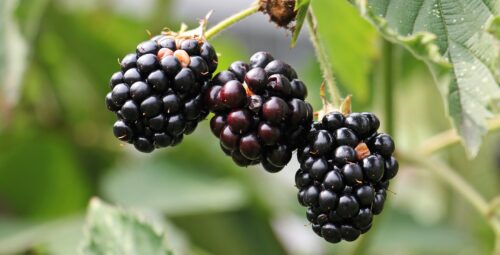
Great source of vitamin K and high in fiber
High in manganese which helps with healthy bone development and a healthy immune system. It also helps your body metabolize carbs, amino acids, and cholesterol.
May boost brain health and help prevent and control gum disease and cavities
Learn more about Blackberries – The above information was taken from an article on healthline.com and it was written by Natalie Butler, RD, LD from an article updated on July 14, 2017 Read the entire article at https://www.healthline.com/health/benefits-of-blackberries
Blueberries
Blueberries have the highest antioxidant capacity of all the popular fruits and vegetables!
It is low in calories but high in fiber, vitamin C and vitamin K.
Several studies suggest that blueberries and blueberry juice reduce DNA damage, which is a leading driver of aging and cancer.
They help lower blood pressure in numerous studies and reduced risk of heart attacks.
They also benefit your brain by aiding brain function and delaying mental decline plus have anti-diabetes effects, improving insulin sensitivity and lowering blood sugar levels.
Learn more about Blueberries:
The above information was taken from an article on healthline.com
Written by Joe Leech, MS
Article written on October 9, 2018
Read the entire article at https://www.healthline.com/nutrition/10-proven-benefits-of-blueberries
Cantaloupe
Cantaloupe is a great source of nutrients. It contains beta-carotene which is a type of carotenoid. Carotenoids are pigments that give fruits and vegetables their bright colors. Once eaten, beta-carotene is either converted into vitamin A or acts as a powerful antioxidant to help fight free radicals that attack cells in your body.
Vitamins: protein, Vitamin K, niacin, choline, calcium, magnesium, phosphorous, zinc, copper, manganese, selenium, beta-carotene, Vitamin A, Vitamin B-9, potassium and Vitamin C
Vitamin A helps eyes, red blood cells and the immune system

Cantaloupe also contains Vitamin C which helps with blood vessels, cartilage, muscles and collagen in bones and may help the common cold.
It also contains folate which is Vitamin B-9 and helps prevent neural-tube birth defects.
Potassium is also found in Cantaloupes which helps keep the right water balance between cells and body fluids as well as muscle contraction provides electrolytes.
Cantaloupe contains many other minerals shown below.
Learn more:
The above information was taken from an article on healthline.com
Written by Annette McDermott
Updated on October 11, 2019
Read the entire article at https://www.healthline.com/health/food-nutrition/benefits-of-cantaloupe
Oranges
Oranges are a healthy source of fiber, vitamin C, thiamine, folate, and antioxidants. Oranges may benefit heart health and help prevent kidney stones. While not rich in iron, they may also protect against anemia by increasing your iron absorption.
Heart health – Heart disease is currently the world’s most common cause of premature death. Flavonoids — especially hesperidin — in oranges may have protective effects against heart disease (11Trusted Source, 16).
Clinical studies in humans note that daily intake of orange juice for four weeks has a blood-thinning effect and may reduce blood pressure significantly (11Trusted Source, 17Trusted Source).
Fibers also seem to play a role. Intake of isolated fibers from citrus fruits has been shown to decrease blood cholesterol levels (8).
Taken together, it is likely that regular consumption of oranges may help lower your risk of heart disease.
Kidney stone prevention – Oranges are a good source of citric acid and citrates, which are believed to help prevent kidney stone formation.
Potassium citrate is often prescribed to patients with kidney stones. Citrates in oranges seem to have similar effects (14Trusted Source, 15Trusted Source).
Anemia prevention – Anemia is a condition characterized by low levels of red blood cells or hemoglobin, decreasing its ability to carry oxygen. It is often caused by iron deficiency.
Although oranges are not a good source of iron, they are an excellent source of organic acids, such as vitamin C (ascorbic acid) and citric acid.
Both vitamin C and citric acid can increase your body’s absorption of iron from the digestive tract (18Trusted Source, 19Trusted Source).
When eaten with iron-rich food, oranges may help prevent anemia.
Learn more about Oranges – The above information was taken from an article on healthline.com and it was written by Atli Arnarson PhD from an article written on March 18th, 2019. To learn more about Oranges and read the entire article, go to https://www.healthline.com/nutrition/foods/oranges
Peaches
Peaches have a lot of nutrients and antioxidants because they have many vitamins, and minerals.
Vitamins: Protein, Vitamin C, Vitamin A, Potassium, Niacin, Vitamin E, Vitamin K, Copper, Manganese
Antioxidants help protect your body from aging and disease.
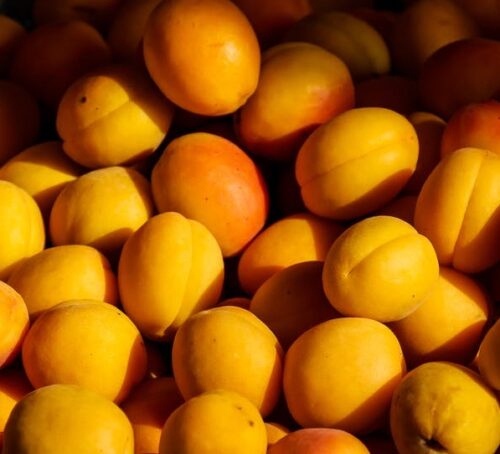
The may help with digestion because of the fiber in them. Fiber contributes to smooth digestion and a lower risk of gut disorders.
They may also improve heart health, protect skin by maintaining moisture and protecting against sun damage and may prevent certain types of cancer.
Learn more about Peaches:
The above information was taken from an article on healthline.com
Written by Alina Petre, MS, RD (NL) on January 17, 2019
Read the entire article at https://www.healthline.com/nutrition/peach-fruit-benefits
Pineapples
Pineapples are loaded with nutrients and antioxidants that help with inflammation, disease, indigestion, boosting immunity and recovery from surgery.
Vitamins: Vitamins A and K, phosphorus, zinc, calcium, protein, Vitamin C, Manganese, Vitamin B6, Copper, Thiamin, Folate, Potassium, Magnesium, Niacin, Pantothenic acid, Riboflavin and Iron
Pineapples have antioxidants that may reduce the risk of chronic diseases like heart disease, diabetes and certain cancers.
Pineapples have bromelain which are digestive enzymes that breaks down proteins. They may help with digestion, especially with people that have problems of the pancreas as well as reduce inflammation, bruising, pain, and swelling. This can help athletes and people that undergo surgery.
Pineapple also help reduce oxidative stress and inflammation which are linked to cancer. An enzyme bromelain, may aid white blood cell function.

Arthritis can be helped because of the anti-inflammatory properties pineapples provide.
Learn more about Pineapples:
The above information was taken from an article on healthline.com
Written by Ryan Raman, MS, RD on May 26, 2018
Read the entire article at https://www.healthline.com/nutrition/benefits-of-pineapple
Strawberries
Strawberries are very rich in antioxidants and plant compounds. The health benefits include reduced cholesterol, blood pressure, inflammation, and oxidative stress. They may also help prevent big spikes in both blood sugar and insulin levels.
They are a good source of vitamin C, manganese, folate (vitamin B9), and potassium.
They may decrease your risk of heart disease and cancer, as well as help regulate blood sugar.
Learn more about Strawberries – The above information was taken from an article on healthline.com and it was written by Adda Bjarnadottir, MS, RDN (Ice) from an article written on March 27th, 2019. Read the entire article at https://www.healthline.com/nutrition/foods/strawberries
Peaches have a lot of nutrients and antioxidants because they have many vitamins, and minerals.
______________________________
NUTS
Almond Milk
Almond Milk is naturally lactose-free, making it a good alternative to dairy. It is also enriched with calcium which is important for bone health, including the prevention of fractures and osteoporosis. Almonds are naturally high in vitamin E which is a powerful antioxidant that combats inflammation and stress in the body.
Almonds are naturally high in vitamin E which s a powerful antioxidant that combats inflammation and stress in the body. It also helps protect against heart disease and cancer, and it may also have beneficial effects on bone and eye health. Studies have also found it benefits brain health to improve mental performance and reduce the risk of Alzheimer’s disease and may slow its progression.
Almond milk is enriched with calcium to provide 20–45% of your daily requirements per serving. Calcium is particularly important for bone health, including the prevention of fractures and osteoporosis.
Almond milk is fortified with vitamin D and helps with heart function, bone health and immune function.
Up to 75% of the world’s population is lactose intolerant. Almond milk is naturally lactose-free, making it a good alternative to dairy. It is also completely plant-based, making it suitable for vegans and other people who avoid dairy products.
People with chronic kidney disease often avoid dairy due to its high levels of potassium and phosphorus. Almond milk has much lower levels of these nutrients and may be a suitable alternative.
Vitamins: E and D
Learn more about Almond Milk:
The above information was taken from an article on healthline.com
Written by Elise Mandl, BSc, APD
Article written on December 24, 2017
Read the entire article at https://www.healthline.com/nutrition/almond-milk-health-benefits
______________________________
SEEDS
Cacao Powder
Cacao powder originates from cacao beans grown in Central and South America. When processed thoroughly and liquified, cocoa transforms from cocoa powder to chocolate.
Vitamins: Iron, Magnesium, and Antioxidants
Rich in polyphenols which help reduce inflammation and improve cholesterol levels.
Can reduce blood pressure because of it’s flavanols which can also help improve brain degeneration.
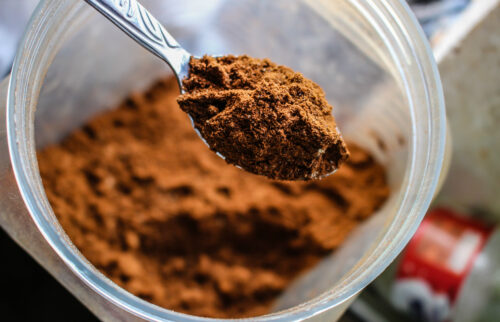
It can also improve blood flow and lower cholesterol levels which helps reduce heart attacks and strokes
It can also help with depression and stress.
Cacao is also to know to help achieve faster weight loss.
It can also give you healthy teeth by fighting bacteria that cause cavities and can give you healthy skin by protecting it from sunlight and improving circulation.
To learn more, visit https://www.healthline.com/nutrition/cocoa-powder-nutrition-benefits
Written by Elise Mandl, BSc, APD on August 9, 2018
______________________________
SPICES
Cinnamon
Cinnamon is a popular spice. It comes from Ancient Egypt and use to be given as a valuable gift to kings.
Vitamins: Cinnamaldehyde
Cinnamon contains large amounts antioxidants which give anti-inflammatory effects which help lower disease risk.
It can also reduce heart disease, including cholesterol, blood pressure and triglycerides.

Cinnamon has been shown to lower blood sugar levels because it increase sensitivity to the hormone insulin with a powerful anti-diabetic effect at 1–6 grams or 0.5–2 teaspoons per day!
Cinnamaldehyde has antibacterial properties which may reduce infections and fight tooth decay plus bad breath.
It can also fight HIV-1, the main type of HIV virus in humans.
Learn more about Cinnamon:
The above information was taken from an article on healthline.com
Written by Joe Leech, MS on July 5, 2018
Read the entire article at https://www.healthline.com/nutrition/10-proven-benefits-of-cinnamon
Ginger
Ginger is among the healthiest spices on the planet. It is loaded with nutrients and bioactive compounds that have powerful benefits for your body and brain. It is high in gingerol, a substance with powerful anti-inflammatory and antioxidant properties. It can help with morning sickness, muscle pain and soreness, osteoarthritis, lower blood pressure and improve heart disease risk, chronic indigestion, reduce menstrual pain, lower cholestorol levels, prevent cancer, protect against Alzheimer’s disease, fight infections and more.
Nausea, Especially Morning Sickness – 1-1.5 grams of ginger can help prevent various types of nausea. This applies to sea sickness, chemotherapy-related nausea, nausea after surgery and morning sickness.
May Reduce Muscle Pain and Soreness – Ginger appears to be effective at reducing the day-to-day progression of muscle pain, and may reduce exercise-induced muscle soreness.
Many other benefits:
- The Anti-Inflammatory Effects Can Help With Osteoarthritis
- May Drastically Lower Blood Sugars and Improve Heart Disease Risk Factors
- Can Help Treat Chronic Indigestion
- May Significantly Reduce Menstrual Pain
- May Lower Cholesterol Levels
- May Help Prevent Cancer
- May Improve Brain Function and Protect Against Alzheimer’s Disease
- The Active Ingredient in Ginger Can Help Fight Infections
Learn more about Ginger – The above information was taken from an article on healthline.com and it was written by Joe Leech, Dietitian, from an article written on June 4th, 2017. Read the entire article at https://www.healthline.com/nutrition/11-proven-benefits-of-ginger#TOC_TITLE_HDR_2
Turmeric
Turmeric may be the most effective nutritional supplement in existence. Many high-quality studies show that it has major benefits for your body and brain. It has powerful anti-inflammatory effects and is a very strong antioxidant. It can help with inflammation, depression, Alzheimer’s disease, delay or reverse age-related decreases in brain function, heart disease, cancer, arthritis and more.
Most of the studies on this herb are using turmeric extracts that contain mostly curcumin itself, with dosages usually exceeding 1 gram per day.Unfortunately, curcumin is poorly absorbed into the bloodstream. It helps to consume black pepper with it, which contains piperine, a natural substance that enhances the absorption of curcumin by 2,000% (3Trusted Source).
Chronic inflammation contributes to many common Western diseases. Curcumin can suppress many molecules known to play major roles in inflammation.
Powerful antioxidant effects, it neutralizes free radicals on its own but also stimulates your body’s own antioxidant enzymes.
Boosts levels of the brain hormone BDNF, which increases the growth of new neurons and fights various degenerative processes in your brain like:
- Depression
- Alzheimer’s disease
- Can delay or even reverse many brain diseases and age-related decreases in brain function.
Heart Disease, it improves the function of the endothelium and is a potent anti-inflammatory agent and antioxidant.
Cancer, prevent and perhaps even treat cancer
Arthritis, can help treat symptoms of arthritis and is in some cases more effective than anti-inflammatory drugs.
Learn more about Tumeric– The above information was taken from an article on healthline.com and it was written by Kris Gunars, BSc from an article written on July 13th, 2018. Read the entire article athttps://www.healthline.com/nutrition/top-10-evidence-based-health-benefits-of-turmeric
______________________________
VEGETABLES
Beets
Beets are low in calories and a great source of nutrients, including fiber, folate and vitamin C. They also contain nitrates and pigments that may help lower blood pressure and improve athletic performance.
Many Nutrients in Few Calories – Beets are loaded with vitamins and minerals and low in calories and fat. They also contain inorganic nitrates and pigments, both of which have a number of health benefits.
Help Keep Blood Pressure in Check – Beets contain a high concentration of nitrates, which have a blood pressure-lowering effect. This may lead to a reduced risk of heart attacks, heart failure and stroke.
Can Improve Athletic Performance – Eating beets may enhance athletic performance by improving oxygen use and time to exhaustion. To maximize their effects, beets should be consumed 2–3 hours prior to training or competing.
Learn more about Beets – The above information was taken from an article on healthline.com and it was written by Daisy Coyle, APD on May 26, 2017. To learn more about Beets and read the entire article, go to https://www.healthline.com/nutrition/benefits-of-beets#section2
Spinach
Spinach amaranth family and is related to beets and quinoa.
Vitamins: A, C, K1, B6, B9, E, Protein, Folic Acid, Iron and Calcium
Spinach is high in insoluble fiber which adds bulk to stool and may help prevent constipation.
It has compounds like:
- Lutein and Zeaxanthin which help eye health
- Kaempferol helps with cancer and other diseases
- Nitrates which helps with heart health
- Quercetin which helps with infections and inflammation.
Spinach is high in carotenoids and your body is able to turn that into vitamin A
The vitamin C in spinach is a powerful antioxidant that promotes skin health and immune function.
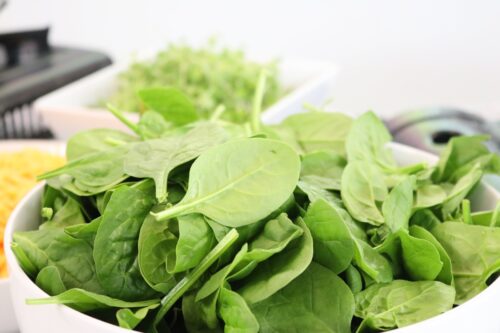
Spinach has iron that helps create hemoglobin, which brings oxygen to your body’s tissues and calcium which is essential for bone health.
Spinach has been shown to improve oxidative stress, eye heath, and blood pressure.
RISKS: Spinach has been shown to be a risk to those who may have a high chance of developing kidney stones and because it is high in vitamin K1, it can cause blood clotting so spinach can be a problem for people on blood thinners.
